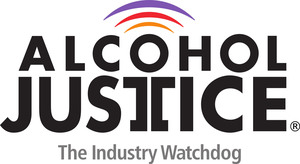Alcohol Justice: Senator Wiener Randomly Adds Fresno to His Zombie 4 a.m. Bar Bill, SB 58
NEW "Local Control" Video: 3rd Times the Harm - STOP SB 58
Research predicts 230% increase in alcohol-related fatalities, 179% increase in injuries from collisions in rush hours 5 a.m. & 9 a.m.
SACRAMENTO, Calif., March 11, 2019 /PRNewswire/ -- Alcohol Justice and California Alcohol Policy Alliance (CAPA) issued an urgent warning that the California State Senate Governmental Organization Committee (GO) could revive a dead and dangerous 4 a.m. bar bill tomorrow. The "Zombie" bill–it just won't go away–was introduced for a third time by Senator Scott Wiener (D-San Francisco) and Principal Co-Author Assembly Member Miguel Santiago (D-Los Angeles). They seek to impose a preposterously dangerous "pilot program" on ten cities that will make lab rats out of 78 per cent of the California population. With no explanation, Fresno in the Central Valley was added to the bill, where impaired driving from 4 a.m. into commuting hours is likely to more than double.
"The latest myth from Senator Scott Wiener is that SB 58 is what he calls "pure local control," but our latest video shows he is an enemy of local control in this bill and in his SB 50 upzoning bill," stated Bruce Lee Livingston, Executive Director / CEO of Alcohol Justice. "Wiener's 4 a.m. bar bill will cause death and maiming on the highways in what researchers call "Splash Zones" surrounding the ten "pilot project" cities. Commuters have no "local control" over traffic collisions and drunk drivers during their commute to work from 5 a.m. to 9 a.m."
The latest research predicts a 230% increase in fatalities, and a 179% increase in injury collisions during the morning rush hours from 5 a.m. to 9 a.m. (Analysis by PourSafe.com with Statewide Integrated Traffic Records System (SWITTERS) / CHP data).
Alcohol Justice and California Alcohol Policy Alliance (CAPA) issued a powerful report in 2018 (The Late Night Threat: Science, Harms, and Costs of Extending Bar Service Hours) to help kill Wiener's 2nd attempt at a 4 a.m. bar bill - SB 905. Governor Brown with advice from California Highway Patrol vetoed the bill with these words: "I believe we have enough mischief from midnight to 2 without adding two more hours of mayhem."
California currently suffers over 10,500 alcohol-related deaths and $35 billion in costs annually. The California Office of Traffic Safety has reported that fatal DUI is a chronic, worsening problem for the state. Between 2014 and 2016, alcohol-related crash deaths rose 21%. That number can only go up with two additional hours of alcohol consumption. Thus, the only benefit of selling alcohol between 2 a.m. and 4 a.m. will be greater profits to bar, restaurant, and club owners in the party zones the bill creates. Meanwhile, the public and all levels of government will be forced to continue to cover the costs of cleaning up the mess that follows.
Last Tuesday, March 5, Los Angeles City Councilman Paul Koretz, introduced a resolution opposing the idea of earlier bar times. "Let me be clear: If this passes we can expect more DUIs, more drunk driving and more alcohol-related deaths," Koretz said at a 2017 City Hall news conference. "Once this is the law, it will be much harder to reverse."
Carson Benowitz-Fredericks, research manager at Alcohol Justice, summarized the existing evidence supporting how the acute effects of extending alcohol sales would spread to "Splash Zones" surrounding the 10 cities mentioned in the bill: Los Angeles, San Francisco, Sacramento, Oakland, Long Beach, West Hollywood, Fresno, Palm Springs, Cathedral City, & Coachella.
He also commented that a true "pilot project" would cover a small sample, not the 78% of the state's population that will be exposed to additional alcohol-related harms if SB 58 becomes law. Benowitz-Fredericks stated, "The bill does not contain any language detailing the collection or analysis of data or even how to pay for this so-called pilot project."
"Time will tell if the compelling, peer-reviewed data on harms and costs resulting from two additional hours of alcohol sales will be enough to override the greedy late-night entertainment lobby," stated Veronica De Lara, Co-Chair, California Alcohol Policy Alliance. "These forces have been trying since 2003 to generate more alcohol-related profits while avoiding any liability for the catastrophic harm alcohol does to our communities."
In response to Wiener's first attempt at a 4 a.m. bar bill (SB384) in 2017, a written response was delivered from Jonathan Fielding, M.D., M.P.H., M.A., M.B.A, Distinguished Professor UCLA Fielding School of Public Health and UCLA Geffen School of Medicine. Dr. Fielding was Chair of the U.S. Community Preventive Services Task Force that found in a peer-reviewed, global meta-analysis that every 2-hour increase in last-call times results in greater vehicle crash injuries and E.R. admissions. (Hahn et al., 2010) Dr. Fielding stated, "…I have no reason to believe that an increase in hours of sale anywhere in the U.S. would have different results."
"Alcohol related crime and nuisance activity is on the rise in Hollywood and is further exacerbated by the homeless issue and the recent legalization of Marijuana," says Gilbert Mora, Prevention Coordinator for Behavioral Health Services Inc., Hollywood, CA, and a member of Los Angeles Drug Alcohol Policy Alliance, (L.A. DAPA). "To extend serving hours beyond 2 a.m. would only stretch the police department's limited resources and cause undue stress on a police force barely keeping pace with rising crime in the area."
Wiener's third attempt at passing a 4 a.m. bar bill will, like his first two attempts, strip away the protections of a uniform, normal closing time of 2 a.m. This will create "commuting drinkers" who travel impaired from a 2 a.m. last call city to a 4 a.m. last call city. This draws opposition of local health, prevention, and recovery groups as well as MADD and law enforcement organizations.
"Nightlife is not meant or geared up for "responsible decisions" and it perpetuates judgment impairment, human trafficking, and sex exploitation among many other issues in my community," states Gennesis Jerez, mother, daughter, granddaughter and community advocate from Koreatown, Los Angeles, and Co-chair of Coalition to Prevent Alcohol-Related Harms in LA Metro (CoPALM). "I stand in opposition to the 4 a.m. bill, not just for myself, but for those who do not have a voice due to their immigration status, age, language barrier or any other hindrance. I am here for my community."
"I live and work in Venice where I talk to community members as part of my work all the time," says Sarah Blanch, Co-Chair of the Los Angeles Drug and Alcohol Policy Alliance (LA DAPA). "Venice is packed with bars and restaurants near residential areas. People don't want later drinking times. They don't want more noise; they don't want more drunkenness. They don't want more fighting and drunk driving. Period. They just don't want it. Please VOTE NO on SB 58."
Watch the latest "Local Control" VIDEO to – 3rd Times the Harm – STOP SB 58
TAKE ACTION to STOP SB 58.
Go to AlcoholJustice.org. for more information
CONTACT: Michael Scippa 415 548-0492
Jorge Castillo 213 840-3336
SOURCE Alcohol Justice
Related Links
WANT YOUR COMPANY'S NEWS FEATURED ON PRNEWSWIRE.COM?
Newsrooms &
Influencers
Digital Media
Outlets
Journalists
Opted In





Share this article